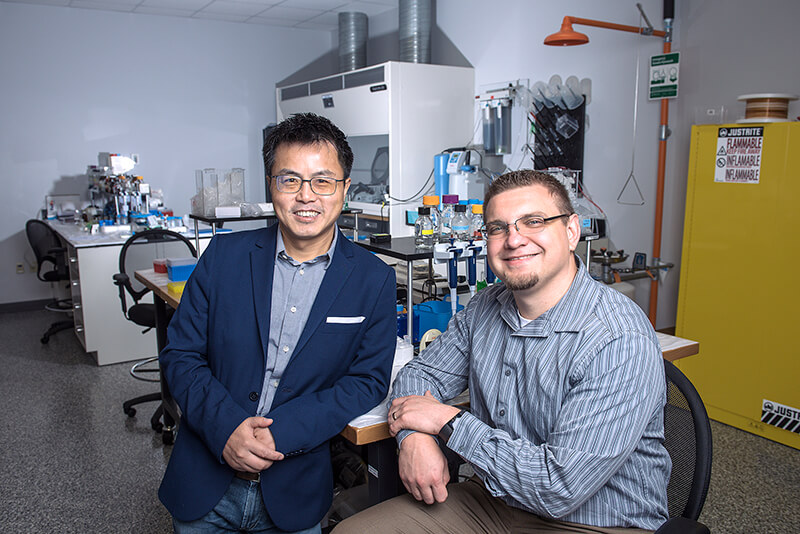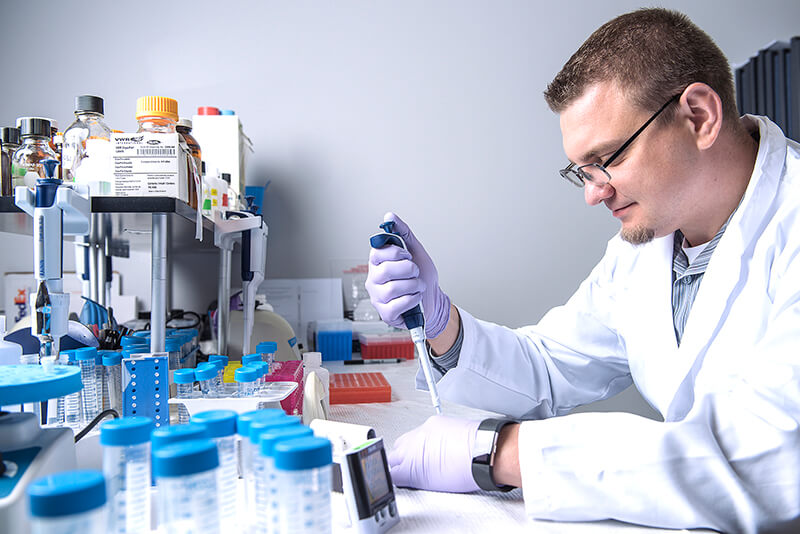October 26, 2017
Purdue startup advances simple blood, urine tests to detect, monitor a myriad of early-stage cancers
 W. Andy Tao (left), a Purdue University professor of biochemistry, member of the Purdue University Center for Cancer Research and the chief scientific officer for Tymora Analytical Operations and Anton Iliuk, Tymora’s chief technology officer, in their lab at the Ross Enterprise Center in Purdue Research Park. They discovered a way to detect and monitor breast cancer using a simple blood test and bladder cancer using a urine test and they believe the process can be expanded to diagnose a myriad of early-stage cancers. (Purdue University/Charles Jischke)
Download image
W. Andy Tao (left), a Purdue University professor of biochemistry, member of the Purdue University Center for Cancer Research and the chief scientific officer for Tymora Analytical Operations and Anton Iliuk, Tymora’s chief technology officer, in their lab at the Ross Enterprise Center in Purdue Research Park. They discovered a way to detect and monitor breast cancer using a simple blood test and bladder cancer using a urine test and they believe the process can be expanded to diagnose a myriad of early-stage cancers. (Purdue University/Charles Jischke)
Download image
WEST LAFAYETTE, Ind. – Researchers at Purdue-affiliated company who discovered a way to detect and monitor breast cancer using a simple blood test and bladder cancer using a urine test believe the process can be expanded to diagnose a myriad of early-stage cancers.
The discovery by W. Andy Tao, a professor of biochemistry, member of the Purdue University Center for Cancer Research and the chief scientific officer for Tymora Analytical Operations, was published in the Proceedings of the National Academy of Sciences earlier this year. Tymora Analytical Operations found a method of detecting elevated levels of proteins in blood plasma that signify a patient has cancer.
“We showed we can identify thousands of these phosphorylated proteins in plasma, something that's never been done before,” said Anton Iliuk, Tymora’s chief technology officer. “Scientists have tried over the years to find these proteins, but there’s such a small amount in the blood and urine and they usually are destroyed before you can do anything with them.”
Identifying phosphoproteins in blood previously wasn’t possible because the liver releases phosphatase into the bloodstream, which dephosphorylates proteins. But Tymora found a way to identify the phosphoproteins in blood using centrifuges to separate plasma from red blood cells, and high-speed and ultra-high-speed centrifuges to further separate microvesicles and exosomes. The researchers then used mass spectrometry to measure the phosphorylated proteins.
“We have found a way to find thousands of them,” Iliuk said. “It’s a good beacon of whether cancer is there or not.”
 W. Andy Tao (left), a Purdue University professor of biochemistry, member of the Purdue University Center for Cancer Research and the chief scientific officer for Tymora Analytical Operations and Anton Iliuk, Tymora’s chief technology officer, in their lab at the Ross Enterprise Center in Purdue Research Park. They discovered a way to detect and monitor breast cancer using a simple blood test and bladder cancer using a urine test and they believe the process can be expanded to diagnose a myriad of early-stage cancers. (Purdue University/Charles Jischke)
Download image
W. Andy Tao (left), a Purdue University professor of biochemistry, member of the Purdue University Center for Cancer Research and the chief scientific officer for Tymora Analytical Operations and Anton Iliuk, Tymora’s chief technology officer, in their lab at the Ross Enterprise Center in Purdue Research Park. They discovered a way to detect and monitor breast cancer using a simple blood test and bladder cancer using a urine test and they believe the process can be expanded to diagnose a myriad of early-stage cancers. (Purdue University/Charles Jischke)
Download image
Tymora researchers believe the testing can be used for the early detection of cancers and early signs of relapses. The advantage of using a blood or urine test to detect and monitor cancer is it is far less invasive than scopes or biopsies that remove tissues and is far less costly than an MRI.
“It gives doctors a much better way to monitor patients to see how effective the treatment is,” Iliuk said.
The testing also will help doctors personalize diagnostic testing for each patient because they will be able to test earlier to see what treatments are most effective.
Tymora, which licenses intellectual property discovered by Tao through the Purdue Research Foundation Office of Technology Commercialization, is looking for companies interested in using the method it developed to detect other cancers.
“Right now we don't have the biomarkers yet for each individual cancer. But we have an approach to find these cancers,” Iliuk said.
About Purdue Office of Technology Commercialization
The Purdue Office of Technology Commercialization operates one of the most comprehensive technology transfer programs among leading research universities in the U.S. Services provided by this office support the economic development initiatives of Purdue University and benefit the university's academic activities. The office is managed by the Purdue Research Foundation, which received the 2016 Innovation and Economic Prosperity Universities Award for Innovation from the Association of Public and Land-grant Universities. For more information about funding and investment opportunities in startups based on a Purdue innovation, contact the Purdue Foundry at foundry@prf.org. For more information on licensing a Purdue innovation, contact the Office of Technology Commercialization at innovation@prf.org.
About Tymora Analytical Operations
Tymora Analytical Operations, established in 2010, provides new research services, products and reagents to life science research and development organizations. Tymora has developed nanoscale platform technologies, with PolyMAC and pIMAGO as the lead products, for unmet needs in analysis of protein phosphorylation that relates to the onset of numerous diseases, most notably cancer.
Purdue Research Foundation contact: Tom Coyne, 765-588-1044, tjcoyne@prf.org
Source: Anton Iliuk, 765-490-6834, anton.iliuk@tymora-analytical.com

